Plant-based Meat Market Summary
The global plant-based meat market size was valued at $5.3 billion in 2021, and is projected to reach $33.3 billion by 2031, growing at a CAGR of 20.5% from 2022 to 2031. The market is gaining huge popularity owing to an increasing trend towards veganism and growing concerns over animal welfare. Many supermarkets are now loaded with various plant-based meat products such as ground beef, Quorn meatless patties, veggie sausage, breaded vegan shrimp, and others. Additionally, the growing health concerns over obesity, diabetes, cardiovascular diseases, and other diseases due to high-fat content of animal-based meat products are anticipated to boost the plant-based meat market demand in the upcoming years. This is because plant based meat products have high-protein and low calorie content.
Key Market Trends and Insights
Region wise, North America generated the highest revenue in 2021.
The global plant-based meat market share was dominated by the soy segment in 2021 and is expected to maintain its dominance in the upcoming years
The tempeh segment is expected to witness the highest growth during the forecast
Market Size & Forecast
- 2021 Market Size: USD 5.3 Billion
- 2031 Projected Market Size: USD 33.3 Billion
- Compound Annual Growth Rate (CAGR) (2022-2031): 20.5%
- North America: Generated the highest revenue in 2021
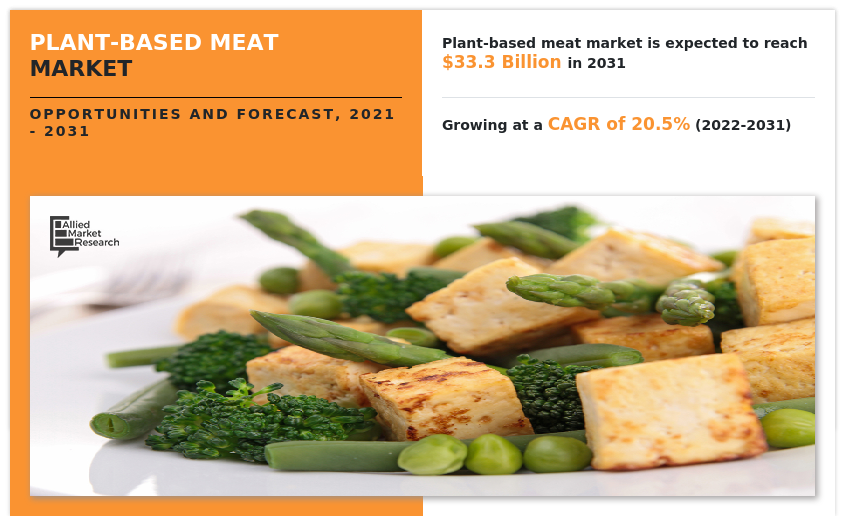
Market Dynamics
The plant-based meat market growth is majorly driven by the ability of these products to imitate animal-based meat products. For instance, these products, mimic the texture, taste, smell, and appearance of animal-based meat products. According to the research study supported by the U.S. National Institutes of Health, the plant-based meat products are an excellent source of folate, iron, fiber, and have less saturated fat content compared to ground beef. The plant-based meat products majorly comprise vegetable protein extract, beet juice, and coconut oil. The shift in consumer preferences towards plant-based meat alternatives owing to the rise in the vegetarian population and flexitarian diet is anticipated to boost the popularity of industry in the upcoming years.
However, compared to animal meat, plant based meat products may not contain essential omega 3 fatty acids, protein, and other nutrients that are abundantly found in animal meat. Also, some of the plant based meat products are full of additives and highly processed which reduces their nutritional value of food. For instance, plant based meat products are loaded with artificial color, flavor, texture, and other additives to mimic the texture, color, and taste of animal based meat products. Also, owing to the high sodium content of plant based meat, it can be harmful to people suffering from hypertension, diabetes, and other health disorders. These aspects are anticipated to hinder the plant-based meat market in the upcoming years.
The industry players are investing a lot of effort in the research and development of smart and unique strategies to maintain their position in the market. Some of these strategies include collaborations, product launches, mergers & acquisitions, collaboration, and others. For instance, in April 2022, Kellogg's, the leading food manufacturing company, collaborated with Benson Hill to supply the raw ingredients necessary to produce alternative meat products. Kellogg's Farms supplied soy components that will be used for the production of alternative animal meat products. Furthermore, various initiatives by animal welfare organizations such as People for the Ethical Treatment of Animals (PETA), aimed at minimizing excessive killing of animals for meat consumption, is estimated to boost the plant-based meat market during the analysis timeframe.
Segment Overview
The global plant-based meat market is segmented on the basis of product type, source, distribution channel, and region. By product type, the market is sub-segmented into tofu, tempeh, seitan, and others. By source, the market is classified into soy, pea, wheat, and others. By distribution channel, the market is sub-segmented into direct and indirect. By region, the market is analyzed across North America, Europe, Asia-Pacific, and LAMEA.
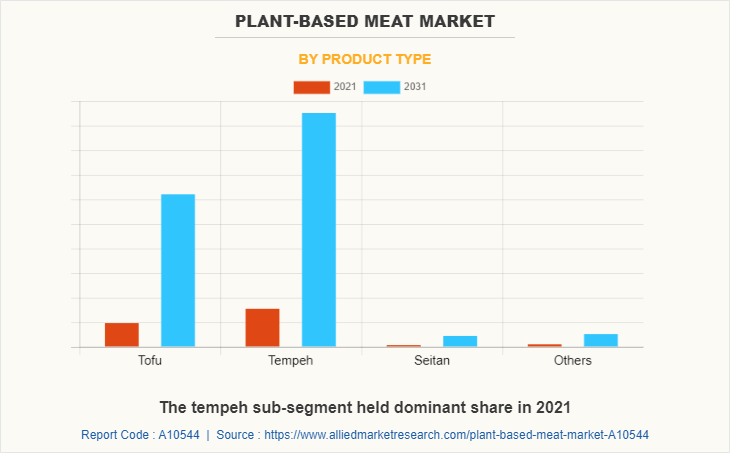
By product type, the tempeh sub-segment has acquired the highest market share in 2021. The production of plant based meat from tempeh as a product type is a simple process and the desired purity of plant based meat can be conveniently achieved. Also, the use of tempeh as a product is safe compared to animal meat which has a high risk of cardiovascular disease owing to high cholesterol content. The plant based meat produced from tempeh is the protein powerhouse that is found in hair, skin & nails, and supports the transport of oxygen which maintains the healthy functioning of the body. These are the major factors estimated to boost the demand for tempeh in the upcoming years.
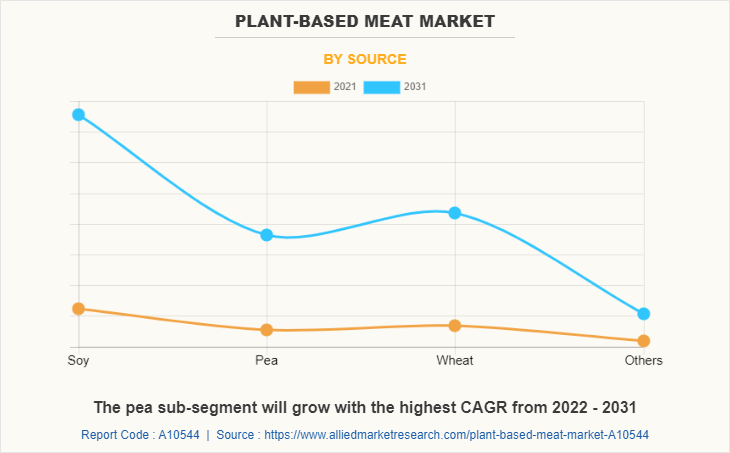
By source, the soy sub-segment dominated the global plant based meat market in 2021. Soy is widely used as an alternative to animal-based meat. This is majorly owing to the meat-like texture and taste of the soy protein. Thus, soy is widely used in plant based meat products such as sausage, minced meat analog, burger patties, and other products. Thus, many meat alternatives are prepared using concentrated sources of soy protein such as soy protein concentrate (SPC) and soy protein isolate (SPI). Some of the popular soy products are soy milk, tempeh, tofu, edamame, and others. These factors are anticipated to boost the demand for soy sub-segment during the forecast period.
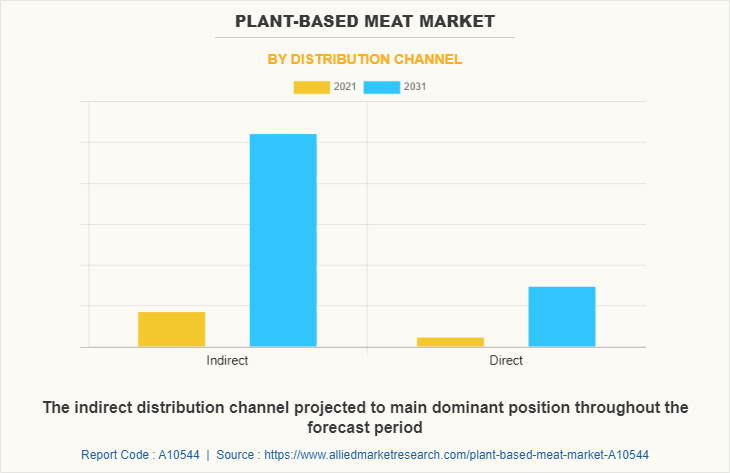
By distribution channel, the indirect sub-segment dominated the global plant-based meat market in 2021. The indirect sub-segment comprises plant based meat products sold to wholesalers, agents, or retailers so that they can distribute the products to the customers. These wholesalers, retailers, and agents are collaborating with major meat product manufacturers for the launch of plant based meat products. Such collaborations will help wholesalers, retailers, and agents in attracting a large number of customers globally. There are various advantages associated with indirect distribution channel as the distribution agents and retailers know their local markets and specialize in getting products into the market. These are the major factors driving the growth of the indirect sub-segment during the forecast period.
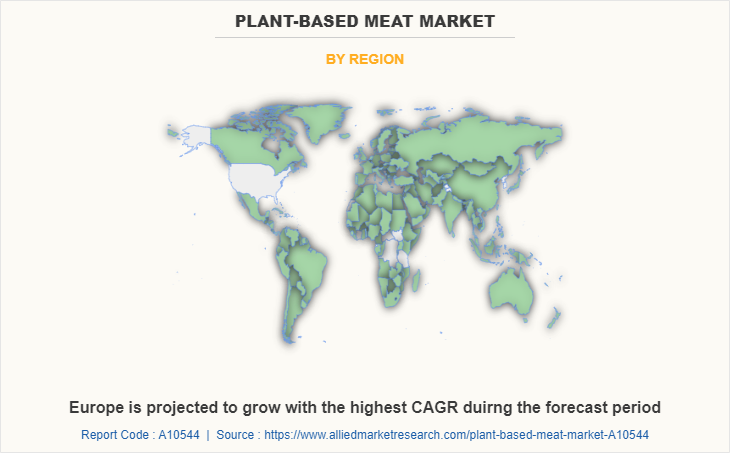
By region, North America dominated the global market in 2021, and Europe region is projected to remain the fastest-growing sub-segment during the forecast period. This growth is majorly owing to growing popularity of plant based meat in the U.S. owing to environmental, health, and ethical reasons. For instance, replacing the animal based meat products with plant based products can address the growing environmental concerns related to increasing carbon footprint. Also, animal cruelties and climate change are some of the factors behind the growing popularity of vegan meat. Celebrity endorsements to promote vegetarianism is another significant factor estimated to boost the growth of plant-based meat industry in this region.
Competition Analysis
The key players profiled in this report include Pinnacle Foods Inc. (Conagra Brands, Inc.), Amy’s Kitchen, Inc., Atlantic Natural Foods, Inc., Lightlife Foods, Inc., Schouten Europe B.V., Sweet Earth, Inc., Impossible Foods Inc., The Kraft Heinz Company, Hain Celestial, Beyond Meat., Pacific Foods of Oregon, LLC, Monde Nissin, Kellogg’s Company, and Fry Family Food.
Key Benefits For Stakeholders
- The report provides exclusive and comprehensive analysis of the global plant-based meat market trends along with the plant-based meat market forecast.
- The report elucidates the plant-based meat market opportunities along with key drivers, and restraints of the market. It is a compilation of detailed information, inputs from industry participants and industry experts across the value chain, and quantitative and qualitative assessment by industry analysts.
- Porter’s five forces analysis helps to analyze the potential of the buyers & suppliers and the competitive scenario of the market for strategy building.
- The report entailing the plant-based meat market analysis maps the qualitative sway of various industry factors on market segments as well as geographies.
- The data in this report aims on plant-based meat market segmentation, dynamics, trends, and developments affecting the market growth.
Plant-based Meat Market Report Highlights
| Aspects | Details |
| Market Size By 2031 | USD 33.3 billion |
| Growth Rate | CAGR of 20.5% |
| Forecast period | 2021 - 2031 |
| Report Pages | 220 |
| By Product Type |
|
| By Source |
|
| By Distribution Channel |
|
| By Region |
|
| Key Market Players | Amy’s Kitchen, Beyond Meat, Impossible Food Inc. |
Analyst Review
One of the main reasons driving the global expansion of plant based meat products is the health advantages offered by plant based meat products as they are low in calories and cholesterol content. Also, the increasing adoption of vegan trends among the public and new innovative plant based meat products launched by new market players are anticipated to boost the plant based meat market demand. Despite being nutritious and containing necessary elements, plant-based meat alternatives have significant drawbacks that may limit market expansion. For instance, Soy's anti-nutritional components can lead to soy allergy and other health problems, which are the key factors expected to hamper the plant based meat market size during the analysis timeframe. On the contrary, people all around the world are opting for plant based meat substitutes due to the environmental impact, animal husbandry, and meat industry malpractices, which are fueling market expansion. Also, the growth of flexitarian consumers seeking to reduce their consumption of flesh is driving the demand for plant based meat products in recent years.
Among the analyzed regions, North America is expected to account for the highest revenue in the market by the end of 2031, followed by Europe, Asia-Pacific, and LAMEA. Veganism is becoming more popular in North America which is the key factor responsible for the market growth.
The global plant-based meat market was valued at $5.3 billion in 2021, and is projected to reach $33.3 billion by 2031
The global Plant-based Meat market is projected to grow at a compound annual growth rate of 20.5% from 2022 to 2031 $33.3 billion by 2031
The key players profiled in this report include Pinnacle Foods Inc. (Conagra Brands, Inc.), Amy’s Kitchen, Inc., Atlantic Natural Foods, Inc., Lightlife Foods, Inc., Schouten Europe B.V., Sweet Earth, Inc., Impossible Foods Inc., The Kraft Heinz Company, Hain Celestial, Beyond Meat., Pacific Foods of Oregon, LLC, Monde Nissin, Kellogg’s Company, and Fry Family Food.
By region, North America dominated the global plant based meat market in 2021
Rise in the vegetarian population & flexitarian diet and the ability of plant-based meat products to imitate animal-based meat products drive the growth of the global plant-based meat market.
Loading Table Of Content...



